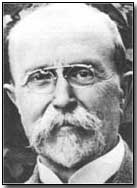Who's Who - Tomas Masaryk
 Tomas Garrigue Masaryk
(1850-1937) was a leading campaigner for Czech independence both prior to
and during World War One and was Czechoslovakia's first President with its
creation at the close of the war.
Tomas Garrigue Masaryk
(1850-1937) was a leading campaigner for Czech independence both prior to
and during World War One and was Czechoslovakia's first President with its
creation at the close of the war.
As a member of the Austrian Reichsrat Masaryk represented first the radical Young Czech Party and then the more moderate (hence its name) Realist Party. Both were determined to achieve the creation of an independent Czech state.
With the outbreak of war in August 1914 Masaryk was fortunate to avoid arrest as an agitator, subsequently fleeing to Geneva in December 1914 and then onwards to London the following March.
During the war Masaryk worked tirelessly to encourage and then commit Allied support for the creation of a Czech state following the war. While in London he co-founded the Czechoslovak National Council based in Paris.
Throughout the war Masaryk worked closely with fellow Czech independence campaigner Eduard Benes, with the latter attending to political negotiations among the Allies while Masaryk functioned in a more ambassadorial capacity.
Following negotiations with the new Bolshevik government in Russia in late 1917 the Czech Legion was formed with Russian blessing, comprised of Austro-Hungarian prisoners of war sited in Russia and which subsequently fought on the Eastern Front against the Central Powers.
A visit to the U.S. was similarly successful, resulting in the Lansing Declaration of May 1918, which supported (at least in principle) the formation of an independent Czech state. By September 1918 Masaryk was being recognised by Allied governments as the prospective head of a Czech state.
The collapse of the Austro-Hungarian Empire in late October 1918 brought with it firm commitment from the Allies to the immediate creation of a new state, Czechoslovakia, in mid-November. Masaryk acted as the new country's first President until his death in 1937, having been twice re-elected. He was succeeded by Benes.
Click here to read Masaryk's statement of July 1918 in which he explained the rationale for Czechoslovak fighting against German and Austro-Hungarian forces in Russia in 1918. Click here to read an extract from Masaryk's address upon re-entering Prague as President in December 1918.
Both British and German fleets had around 45 submarines available at the time of the Battle of Jutland, but none were put to use.
- Did you know?
